

Tongal - Wikipedia, the free encyclopedia - Aurora. Tongal is a rich social media platform that facilitates video content by crowdsourcing creative work through collaborative contests.
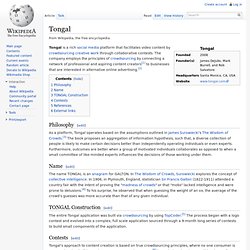
The company employs the principles of crowdsourcing by connecting a network of professional and aspiring content creators[1] to businesses that are interested in alternative online advertising.[2] Philosophy[edit] As a platform, Tongal operates based on the assumptions outlined in James Surowiecki’s The Wisdom of Crowds.[3] The book proposes an aggregation of information hypothesis, such that, a diverse collection of people is likely to make certain decisions better than independently operating individuals or even experts. Furthermore, outcomes are better when a group of motivated individuals collaborates as opposed to when a small committee of like-minded experts influences the decisions of those working under them.
Name[edit] The name TONGAL is an anagram for GALTON. GeniusRocket - Wikipedia, the free encyclopedia - Aurora. GeniusRocket is a small advertising firm specializing in video production through a curated creative community.
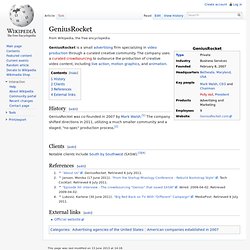
Poptent - Wikipedia, the free encyclopedia - Aurora. Poptent is an Philadelphia, PA- based social video marketing company that specializes in creative crowdsourcing specifically for the purpose of making original and authentic video content for brands, marketers, and agencies.
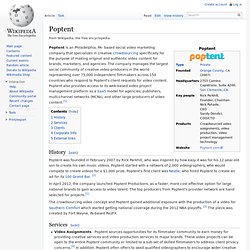
The company manages the largest social community of creative video producers in the world representing over 75,000 independent filmmakers across 150 countries who respond to Poptent's client requests for video content. Threadless - Wikipedia, the free encyclopedia - Aurora. Threadless is an online community of artists and an e-commerce website based in Chicago, Illinois. In 2000, co-founders Jake Nickell and Jacob DeHart started the company with $1,000 of their own money.[2] Threadless designs are created by and chosen by an online community. Jade Magnet - Wikipedia, the free encyclopedia - Aurora. Jade Magnet is an online Crowdsourcing platform for creative and marketing support services.
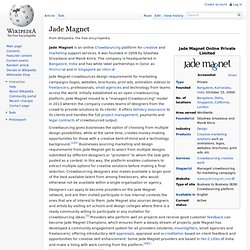
It was founded in 2009 by Sitashwa Srivastava and Manik Kinra. The company is headquartered in Bangalore, India and has white label partnerships in Qatar as Mixilion and in Singapore as id8on. Jade Magnet crowdsources design requirements for marketing campaigns (logos, websites, brochures, print ads, animation videos) to freelancers, professionals, small agencies and technology from teams across the world. Initially established as an open crowdosurcing platform, Jade Magnet moved to a “managed Crowdsourcing” model in 2013 wherein the company curates teams of designers from the crowd to provide solutions to its clients’. It offers delivery assurance to its clients and handles the full project management, payments and legal contracts of crowdsourced output.
Crowdspring - Wikipedia, the free encyclopedia - Aurora. Crowdspring (written "crowdSPRING") is an online marketplace for crowdsourced creative services. [1] Entrepreneurs, small businesses, startups, big Brands and agencies who need a custom logo design, website design, other graphic design, industrial design or copywriting post what they need, when they need it and how much they'll pay.[2] Once posted, creatives from around the world (over 100,000 from 200 countries) submit actual work.
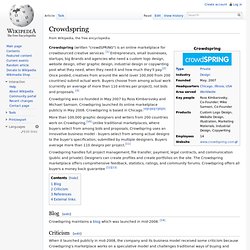
Buyers choose from among actual work (currently an average of more than 110 entries per project), not bids and proposals. [3] Crowdspring was co-founded in May 2007 by Ross Kimbarovsky and Michael Samson. Crowdspring launched its online marketplace publicly in May 2008. Crowdspring is based in Chicago.[4][5][6][7][8][9] Startup of the Week: DesignCrowd (Wired UK) - Aurora. Startup of the Week is a new feature on Wired.co.uk which aims to highlight some of the most innovative businesses emerging across Europe.
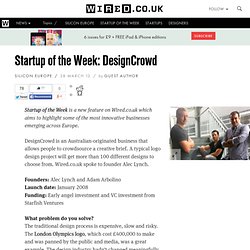
DesignCrowd is an Australian-originated business that allows people to crowdsource a creative brief. A typical logo design project will get more than 100 different designs to choose from. Wired.co.uk spoke to founder Alec Lynch. Founders: Alec Lynch and Adam Arbolino Launch date: January 2008 Funding: Early angel investment and VC investment from Starfish Ventures What problem do you solve? We hypothesised that if the London Olympics Committee had offered £100,000 via an open contest they would have received thousands of ideas from around the world and got a better outcome for 25 percent of the cost. Who do you view as your competitors?
How many employees do you have? Where did you get the idea for the business? What's the biggest misconception about your business? What pushed you to stop talking about launching a startup to actually doing it? Crowd funding - Wikipedia, the free encyclopedia - Aurora. Crowdfunding is the practice of funding a project or venture by raising monetary contributions from a large number of people, typically via the internet.[1] One early-stage equity expert described it as “the practice of raising funds from two or more people over the internet towards a common Service, Project, Product, Investment, Cause, and Experience, or SPPICE.”[2] The crowdfunding model is fueled by three types of actors: the project initiator who proposes the idea and/or project to be funded; individuals or groups who support the idea; and a moderating organization (the "platform") that brings the parties together to launch the idea.[3] In 2013, the crowdfunding industry grew to be over $5.1 billion worldwide.[4] History[edit] Types[edit] The Crowdfunding Centre's May 2014 report identified the existence of two primary types of crowdfunding:

Crowdsourcing - Wikipedia, the free encyclopedia - Aurora. Crowdsourcing is the practice of obtaining needed services, ideas, or content by soliciting contributions from a large group of people, and especially from an online community, rather than from traditional employees or suppliers.[1] This process is often used to subdivide tedious work or to fund-raise startup companies and charities, and can also occur offline.[2] It combines the efforts of numerous self-identified volunteers or part-time workers, where each contributor of their own initiative adds a small portion to the greater result.
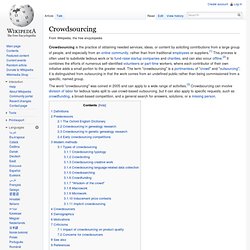
The term "crowdsourcing" is a portmanteau of "crowd" and "outsourcing"; it is distinguished from outsourcing in that the work comes from an undefined public rather than being commissioned from a specific, named group. Definitions[edit] In a February 1, 2008 article, Daren C. Brabham defined "crowdsourcing" as an "online, distributed problem-solving and production model. Crowdsourcers are primarily motivated by its benefits.
Crowdsourcing - Wikipedia, the free encyclopedia - Aurora. Crowdsourcing is the practice of obtaining needed services, ideas, or content by soliciting contributions from a large group of people, and especially from an online community, rather than from traditional employees or suppliers.[1] This process is often used to subdivide tedious work or to fund-raise startup companies and charities, and can also occur offline.[2] It combines the efforts of numerous self-identified volunteers or part-time workers, where each contributor of their own initiative adds a small portion to the greater result.
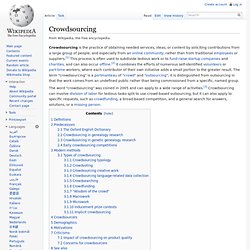
The term "crowdsourcing" is a portmanteau of "crowd" and "outsourcing"; it is distinguished from outsourcing in that the work comes from an undefined public rather than being commissioned from a specific, named group. Sam Brown (artist) - Wikipedia, the free encyclopedia - Aurora. Sam Brown, pseudonym of Adam Culbert, is an American illustrator and author most noted for his website, explodingdog.[1] The gimmick of the site is that he draws pictures based on titles that visitors to the site send him via email or Twitter.
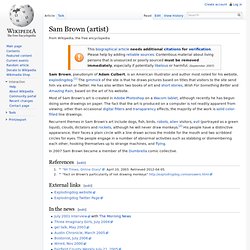
He has also written two books of art and short stories, Wish For Something Better and Amazing Rain, based on the art of his website. Aaron Koblin - Wikipedia, the free encyclopedia - Aurora. Aaron Koblin is an American digital media artist best known for his innovative uses of data visualization and crowdsourcing. He is currently Creative Director of the Data Arts Team at Google in San Francisco, California.[3] Work[edit] References[edit] External links[edit] Crowdsourcing - Wikipedia, the free encyclopedia - Aurora. Crowdsourcing is a sourcing model in which individuals or organizations obtain goods and services. These services include ideas and finances, from a large, relatively open and often rapidly-evolving group of internet users; it divides work between participants to achieve a cumulative result.
The word crowdsourcing itself is a portmanteau of crowd and outsourcing, and was coined in 2005.[1][2][3][4] As a mode of sourcing, crowdsourcing existed prior to the digital age (i.e. "offline").[5] There are major differences between crowdsourcing and outsourcing. IndieGoGo. Indiegogo /ˌɪndiˈɡoʊɡoʊ/ is an international crowdfunding web site. It was founded in 2008 by Danae Ringelmann,[1] Slava Rubin, and Eric Schell. Its headquarters are in San Francisco, California. The site is one of the first sites to offer crowd funding. Indiegogo allows people to solicit funds for an idea, charity, or start-up business.
Indiegogo charges a 9% fee on contributions, and returns 5% if the campaign reaches its goal. The site’s market is anyone who has an idea and wants to raise funds to finance their goal.[2] Nine million people from all around the world visit the site on a monthly basis. The site runs on a rewards-based system, meaning donors, investors, or customers who are willing help to fund a project or product can donate and receive a gift, rather than an equity stake in the company.[3] However, CEO Slava Rubin has stated that the company is interested in moving towards equity funding in the future once laws around it become clearer in the U.S.[4]